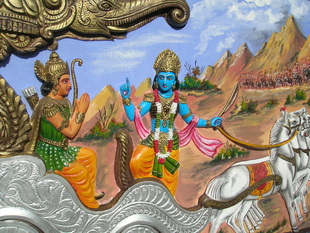 Some of our science greats throughout the last hundred years have been influenced by vedic scriptures from the East. These texts, which date back over 5000 years, contain writings on matter, antimatter and atomic structure as well as the hymns, prayers and myths they are better known for. Some even speak of ancient machines that used to fly through the sky and perform what seem like incredible feats. Though the blur between myth and fact remains a subject of much debate, some of the twentieth centuries most influential thinkers have obviously dabbled in the principles that are espoused by these ancient texts. Two of the pioneers of quantum theory, Erwin Schrodinger and Niels Bohr, were known to have studied vedic principles. They also hung out with some of the leading philosopher's of eastern wisdom. Werner Heisenberg, who has the famous uncertainty principle named after him, spent time with the Rabindranath Tagore. This meeting of the minds helped him to confidently pursue his ideas about quantum mechanics, realising that they were not so crazy after all. “The unity and continuity of Vedanta are reflected in the unity and continuity of wave mechanics. This is entirely consistent with the Vedanta concept of All in One.” - Schrodinger Albert Einstein was a scientist who believed in the power of science and found no contradictions when reading what seem like stories of mysticism and magic in books such as the Bagavad-Gita. He had a deep relationship with what he called God, and relied on these ancient scriptures for much insight. “When I read the Bhagavad-gita and reflect about how God created this universe everything else seems so superfluous.” - Albert Einstein Nikola Tesla spent time with Hindu swami Vivekenanda and was aware of the wisdom contained within vedic literature. Even modern day scientists, such as Fred Alan Wolfe and Rupert Shedlrake, have been influenced by this ancient wisdom as they attempt to bridge material and spiritual realms. Sheldrake not only read vedic works, but also Buddhism and sufi mysticism. His theories, which are being widely accepted by many, run counter to the path that many biologists continue to defend. "My ideas find readier acceptance in the Buddhist and Hindu traditions of the East than in Western culture." - Rupert Sheldrake This is not to claim that they are perfect in any way, and their conclusions are subject to scrutiny today, as will be the scientists of today in the future. Take for instance Robert Oppenheimer, the man in the charge of the group that produced the first atomic bombs. Whereas many scientists read translations of the texts, Oppenheimer had the ability to read ancient sanskrit and studied them throughout his years. At the time of the first atomic weapons test he famously quoted from the Bagavad Gita. "I have become death, destroyer of worlds." Of course he was not in charge of how these weapons would be used, that came down to the decisions made by the military industrial complex, which still makes decisions with many of the technologies being used today. He was, however, aware of just how much damage they could cause in the wrong hands. When used in service to the highest good these technologies may be viewed by many as the holy grail, gifts given from on high to those most worthy of the knowledge and wisdom. If they were alive today many of these scientists would likely find it far easier to credit their discoveries to the influence of eastern spirituality, though even now it is opposed, sometimes violently, by materialists. What is clear is that these men sought self-knowledge first, and through it found a way to contribute to progress for the human race.
0 Comments
Leave a Reply. |
AuthorYoga, spirituality, science, adventures and more. These blogs are designed to uplift your days and help you find clarity. Archives
December 2021
Categories
All
|

 RSS Feed
RSS Feed